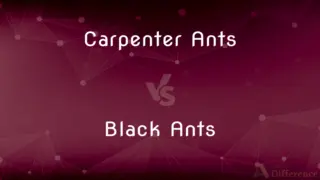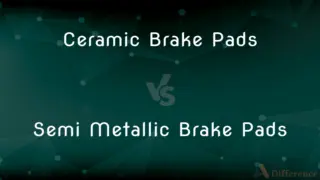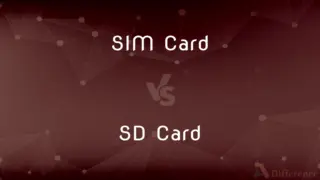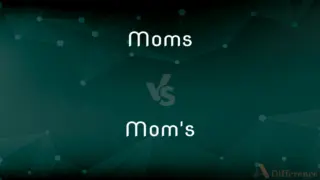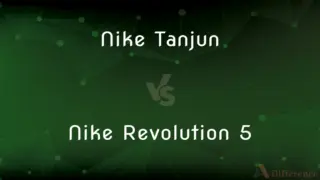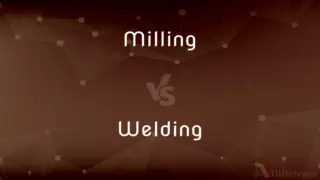Gaze vs. Stare — What's the Difference?
By Tayyaba Rehman — Updated on September 14, 2023
Gaze refers to a soft, prolonged look, often expressing admiration or contemplation; Stare is an intense, prolonged look, often without blinking and sometimes indicating surprise or challenge.

Difference Between Gaze and Stare
Table of Contents
ADVERTISEMENT
Key Differences
A gaze typically carries a sense of admiration, contemplation, or even daydreaming. It's a prolonged look but feels more gentle and soft. Stare, on the other hand, has a sharper edge. When someone stares, it's an intense, fixed look, often perceived as more aggressive or laden with a specific emotion or intent.
In romantic contexts, one might gaze into another's eyes, suggesting a depth of feeling and a sense of wonder or adoration. Contrast this with a stare, which, in the same context, might be interpreted as invasive or too intense, potentially making the other person uncomfortable.
Consider someone observing art in a museum. They might gaze at a painting, soaking in its beauty and trying to grasp its meaning. If they were to stare at it, it would imply a harder, more scrutinizing look, perhaps trying to spot a specific detail or anomaly.
Children, when curious or surprised, often have an open stare, displaying their unfiltered reactions. When they gaze, it's more of a dreamy, lost-in-thought kind of look. Both actions are innocent but convey different levels of intensity and emotion.
Gaze and stare, while both indicating a focused look, differ in the emotion, intensity, and sometimes duration they carry. Context often determines which word is more appropriate to convey the exact nature of the look.
ADVERTISEMENT
Comparison Chart
Emotional Tone
Soft, admiring, contemplative
Intense, challenging, surprised
Duration
Prolonged but gentle
Prolonged and often without blinking
Contextual Usage
Romantic, thoughtful
Surprised, challenging, scrutinizing
Perception
Less aggressive
Can be perceived as invasive
Expression
More dreamy and lost-in-thought
Direct, fixed, unfiltered
Compare with Definitions
Gaze
A steady, attentive look.
The cat's gaze followed the laser pointer intently.
Stare
Staren expression of surprise or disbelief.
His stare revealed his shock at the sudden news.
Gaze
A look filled with admiration or contemplation.
His gaze was filled with admiration as he watched her dance.
Stare
Stare look without blinking.
The owl's stare was both eerie and captivating.
Gaze
A deep, reflective look.
He directed his gaze towards the horizon, pondering the future.
Stare
Staren intense, fixed look.
She felt uncomfortable under his unwavering stare.
Gaze
An act of looking steadily.
Her gaze never wavered from the stage during the entire performance.
Stare
Stare challenging or confrontational look.
She met his accusations with a defiant stare.
Gaze
A soft, prolonged look.
She would often gaze at the stars, lost in thought.
Stare
Look fixedly or vacantly at someone or something with one's eyes wide open
Robyn sat staring into space, her mind numb
He stared at her in amazement
Gaze
In critical theory, sociology, and psychoanalysis, the gaze (French le regard), in the philosophical and figurative sense, is an individual's (or a group's) awareness and perception of other individuals, other groups, or oneself. The concept and the social applications of the gaze have been defined and explained by existentialist and phenomenologist philosophers.
Stare
A long fixed or vacant look
She gave him a cold stare
Gaze
To look steadily, intently, and with fixed attention.
Stare
To look directly, fixedly, or vacantly, often with a wide-eyed gaze.
Gaze
A steady, fixed look.
Stare
To look at directly and fixedly
Stared him in the eyes.
Gaze
(intransitive) To stare intently or earnestly.
They gazed at the stars for hours.
Stare
An intent gaze.
Gaze
To stare at.
Stare
To look fixedly (at something).
Gaze
A fixed look; a look of eagerness, wonder, or admiration; a continued look of attention.
Stare
(transitive) To influence in some way by looking fixedly.
To stare a timid person into submission
Gaze
(archaic) The object gazed on.
Stare
(intransitive) To be very conspicuous on account of size, prominence, colour, or brilliancy.
Staring windows or colours
Gaze
(psychoanalysis) In Lacanian psychoanalysis, the relationship of the subject with the desire to look and awareness that one can be viewed.
Stare
To stand out; to project; to bristle.
Gaze
To fix the eyes in a steady and earnest look; to look with eagerness or curiosity, as in admiration, astonishment, or with studious attention.
Why stand ye gazing up into heaven?
Stare
A persistent gaze.
The stares of astonished passers-by
Gaze
To view with attention; to gaze on .
And gazed a while the ample sky.
Stare
A starling.
Gaze
A fixed look; a look of eagerness, wonder, or admiration; a continued look of attention.
With secret gazeOr open admiration him behold.
Stare
The starling.
Gaze
The object gazed on.
Made of my enemies the scorn and gaze.
I that rather held it better men should perish one by one,Than that earth should stand at gaze like Joshua's moon in Ajalon!
Stare
The act of staring; a fixed look with eyes wide open.
Gaze
A long fixed look;
He fixed his paternal gaze on me
Stare
To look with fixed eyes wide open, as through fear, wonder, surprise, impudence, etc.; to fasten an earnest and prolonged gaze on some object.
For ever upon the ground I see thee stare.
Look not big, nor stamp, nor stare, nor fret.
Gaze
Look at with fixed eyes;
The students stared at the teacher with amazement
Stare
To be very conspicuous on account of size, prominence, color, or brilliancy; as, staring windows or colors.
Stare
To stand out; to project; to bristle.
Makest my blood cold, and my hair to stare.
Take off all the staring straws and jags in the hive.
Stare
To look earnestly at; to gaze at.
I will stare him out of his wits.
Stare
A fixed look with eyes open wide
Stare
Look at with fixed eyes;
The students stared at the teacher with amazement
Stare
Fixate one's eyes;
The ancestor in the painting is staring down menacingly
Stare
Stare scrutinizing observation.
His stare was fixated on the fine details of the painting.
Common Curiosities
Is a stare considered more intense than a gaze?
Yes, a stare is typically more intense and direct than a gaze.
Can both gaze and stare be prolonged looks?
Yes, both can be prolonged, but a gaze is softer, while a stare is more fixed.
Can gazing be considered romantic?
Yes, gazing into someone's eyes is often considered a romantic gesture.
How do animals typically gaze or stare?
Animals might gaze when curious or relaxed and stare when threatened or intensely focused.
How is gazing used in meditation practices?
Gazing can be a focus technique, such as candle gazing, to aid concentration.
Do cultural norms around gazing and staring differ?
Yes, in some cultures, direct staring can be considered especially rude or confrontational.
Is it appropriate to stare at strangers?
Generally, staring can make others uncomfortable and is often considered impolite.
Is gazing always positive?
Mostly, but depending on context, it can sometimes be perceived as distant or distracted.
What emotion does a gaze usually convey?
A gaze often conveys admiration, contemplation, or a dreamy reflection.
What's the difference in body language between gaze and stare?
A gaze is relaxed, while a stare can be unblinking and more rigid.
Can you stare at something without realizing?
Yes, people often stare when lost in thought or daydreaming.
Which term, gaze or stare, indicates a more dreamy look?
Gaze typically indicates a more dreamy, lost-in-thought look.
Is a stare always aggressive?
No, but it can be perceived as aggressive or invasive, depending on the context.
Can staring be a sign of surprise?
Yes, people often stare when shocked or surprised.
Why is it uncomfortable when someone stares?
Staring can feel invasive or like an unspoken challenge, making one feel observed or judged.
Share Your Discovery

Previous Comparison
Truth vs. Dare
Next Comparison
Situation vs. ContextAuthor Spotlight
Written by
Tayyaba RehmanTayyaba Rehman is a distinguished writer, currently serving as a primary contributor to askdifference.com. As a researcher in semantics and etymology, Tayyaba's passion for the complexity of languages and their distinctions has found a perfect home on the platform. Tayyaba delves into the intricacies of language, distinguishing between commonly confused words and phrases, thereby providing clarity for readers worldwide.














